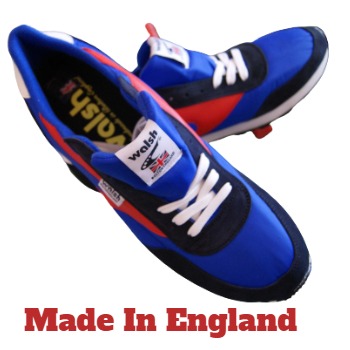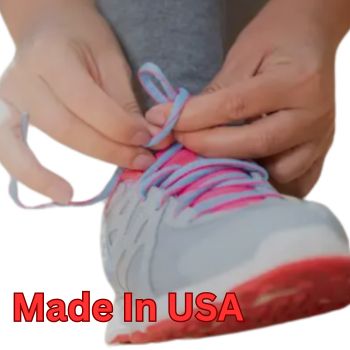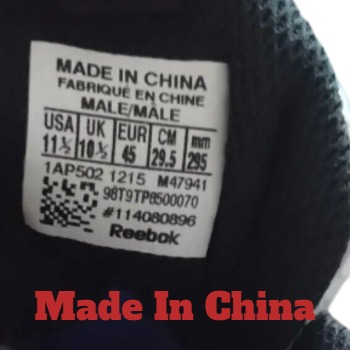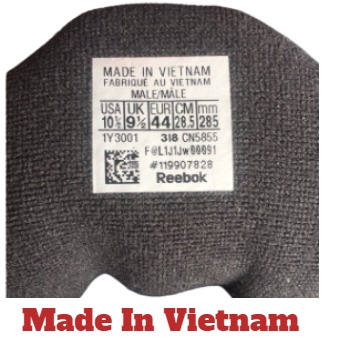Reebok, a household name in sport and lifestyle footwear, has a rich history that spans decades. Enthusiasts and conscious consumers alike often wonder about the origin of the shoes that grace their feet.

In this comprehensive guide, we’ll explore Reebok shoes at length – their manufacturing facilities and processes, ownership structure, sustainability initiatives and much more.
By the end of your journey, you will gain an in-depth knowledge of where Reebok shoes are produced and what goes into their manufacture.
Quick Answer: Where Are Reebok Shoes Made?
Reebok shoes are made in several countries across the globe, such as England, USA, China and Vietnam – depending on which style or collection it belongs to. Reebok, like many global brands, has chosen manufacturing hubs strategically to optimise production and deliver top quality footwear.
History of Reebok Shoes
Reebok shoes are manufactured across a number of countries worldwide. Reebok uses manufacturing facilities in England, the US, China and Vietnam among others; specific locations may depend upon which product and collection the shoe belongs to.
Reebok follows global brands’ best practice by strategically selecting manufacturing hubs to streamline production while simultaneously producing top quality footwear.
Where Are Reebok Shoes Made?
Reebok’s footwear manufacturing landscape has seen significant shifts since 2016. Beginning in 2016, and continuing onwards, an increasing portion of Reebok shoes are produced in the US compared to previously when all were exclusively produced in Asia; indeed, its inaugural shoe was made in England! Reebok continues its rich heritage today!
Reebok currently concentrates its footwear production in Vietnam and China, both Asian countries which play an essential role in shoe component outsourcing arrangements. There have also been reports that Reebok shoes are manufactured elsewhere – including India, Indonesia, Pakistan, Cambodia and Sri Lanka among others.
Reebok footwear production locations vary across nations. Unfortunately, Reebok does not disclose where its footwear originates on their official website, forcing consumers to inquire with local retailers in order to establish where exactly these shoes came from.
Reebok has established itself as an influential brand within the sports footwear industry through global production locations that span all continents and all time zones.
England: The Birthplace of Reebok

Reebok has an illustrious sneaker production history dating back to 1985 in Bolton, England, where most of Reebok’s sneakers were initially made.
Reebok made a strategic move in 2009, following other sports and fashion brands, to shift manufacturing operations away from North America to Asian nations in order to reduce production costs while increasing profit margins.
USA: Special and Limited-Edition Collections
Reebok has established the United States as its global hub for footwear production, a strategic decision implemented from 2016 to the present day. This move came to fruition following Reebok’s acquisition by Authentic Brands Group, marking a significant shift towards domestic shoemaking.

Within the United States, Reebok operates two manufacturing facilities. The first, known as the Liquid Factory, is situated in Wixom, Michigan, and was inaugurated in 2016. The second facility is located in Rhode Island.
These American facilities play a vital role in producing the technical components of Reebok’s shoes, marking a departure from the brand’s previous reliance on overseas manufacturing.
Despite this shift, Reebok continues to outsource certain shoe components to Asian countries. Notably, the Liquid Factory earned its name from the utilisation of a specialised plastic material, referred to as “liquid,” which is jointly produced by Reebok and BASF, a renowned German chemical company.
This unique plastic is integrated into the shoe’s outsole using cutting-edge 3D drawing techniques to ensure a perfect fit.
China: Mass Production Hub
Since 2005, most Reebok shoes and shoe components were manufactured in China by Pou Chen Corp – also a key manufacturing partner of Nike, Adidas and Clarks.

Pou Chen Corp operates factories across China, including Huangjiang Town in Dongguan City, Gaobu Town in Dongguan City, Jida Industrial District in Zhuhai City and Sanxiang in Zhongshan City.
YueYuen Factory I (YueYuen Shoes Factory Dongguan) employed between 3,000 to 4,000 workers dedicated exclusively to producing Reebok shoes.
China, long known for being the global hub for sports giants’ manufacturing needs, traditionally offered numerous advantages for cost-effective shoemaking – low labor costs, skilled workforce, and access to raw materials are among them.
But due to a combination of factors – including COVID-19 pandemic impact, U.S.-China tariff disputes, and increases in labor costs within China – Reebok has reduced its shoemaking activities in this country significantly over time.
Reebok has responded to these changes by making an active decision not to rely solely on one Asian country for manufacturing. While China has received much criticism in terms of working conditions and low wages.
Reebok has ensured strict ethical standards throughout their global supply chains by complying fully with all international labor laws and regulations as part of their dedication towards responsible and ethical manufacturing practices.
Vietnam: Competitive Labor Costs

In the wake of the COVID-19 pandemic, Vietnam has emerged as Reebok’s fresh choice for shoe manufacturing, owing to the robust expansion of its textile and leather industries.
Vietnam, located in Southeast Asia, offers a well-established infrastructure for footwear production. Notably, according to a report from Natixis SA, Vietnam claims the top spot among emerging Asian economies.
This is partly due to the cost advantages it offers, with lower wages and more affordable material costs compared to China.
Other Countries: Diversified Sourcing
Reebok is expanding their global outsourcing to include countries such as India, Indonesia, Pakistan, Cambodia and Sri Lanka – in addition to England, America China Vietnam production centers.
However, it should be remembered that detailed information regarding individual shoe factories located within these countries remains relatively scarce.
Who Owns Reebok Footwear Now?
Authentic Brands Group LLC (ABG) is the proud owner of the renowned Reebok sports brand.
In a significant development in March 2022, ABG successfully completed the acquisition of Reebok from the German sportswear giant, Adidas Group, in a deal valued at $2.46 billion. This monumental acquisition marked a historic milestone for ABG, being the largest since its inception in 2010.
Prior to being owned by ABG, Reebok was under the stewardship of Adidas Group from 2005 to 2022. Adidas had incorporated Reebok into its portfolio in 2005 through a purchase totaling $3.8 billion.
Following the acquisition, ABG has plans to introduce the Reebok Design Group (RDB), a collaborative effort with SPARC Group, a renowned fashion design producer. RDB will play a pivotal role in the production of athletic footwear, including popular models like the Floatride and the Nano.
Pros of Reebok Shoes
Reebok’s commitment to providing comfortable shoes is unmatched. Their designs prioritise cushioning and support.
Reebok footwear is known for incorporating cutting-edge technology, creating shoes that not only look stylish but are high-performing as well.
No matter if you are an athlete or fashion enthusiast, Reebok provides products to meet both groups’ needs.
Reebok’s timeless designs have endured for decades, becoming part of fashion trends over time.
Cons of Reebok Shoes
Price Range: While Reebok offers budget-friendly options, some premium models can be on the expensive side.
Sizing Variations: Like most shoe brands, Reebok can have variations in sizing, making it essential to try on shoes before purchasing.
How Are Reebok Shoes Made?
Reebok’s commitment to innovation and sustainability is evident in their manufacturing processes. Let’s delve into how Reebok shoes are made with exclusive innovations while maintaining sustainability.
Made With Exclusive Innovations
Reebok’s dedication to cutting-edge technology ensures that their shoes provide top-notch performance and comfort. Explore the unique innovations that set Reebok footwear apart:
3D Ultralite Technology: This technology is a hallmark of Reebok’s lightweight and cushioned midsoles.
Flexweave: A specialised woven textile that offers breathability and durability.
Floatride Energy Foam: Known for its responsiveness and lightweight cushioning.
Maintain Sustainability
Reebok is mindful of its environmental footprint. To mitigate it, they’ve taken measures to make their manufacturing processes as eco-friendly as possible. Discover their sustainability efforts and practices:
Recycled Materials: Reebok incorporates recycled materials into their shoes, reducing waste.
Energy-Efficient Production: The brand focuses on minimising energy consumption during manufacturing.
Sustainable Packaging: Reebok is committed to reducing its packaging’s environmental footprint.
Where Are Real Reebok Shoes Made? We address questions about the authenticity and manufacturing locations of genuine Reebok shoes:
- Are real Reeboks made in Vietnam?
- Are any sneakers made in the US?
- Does Reebok own their factories?
Are real Reeboks made in Vietnam?
Yes, genuine Reebok shoes are indeed manufactured in Vietnam, among other countries. Vietnam plays a significant role in Reebok’s global production network.
Are any sneakers made in the US?
Yes, some Reebok sneakers are still manufactured in the United States, particularly in Massachusetts and South Carolina.
Does Reebok own their factories?
Reebok relies on a combination of in-house manufacturing and outsourcing. The brand collaborates with different manufacturing partners to meet its production needs.
Final Decision: Reebok Shoes Made
Reebok’s manufacturing network spans multiple countries, from England and the US through China and Vietnam. Reebok meets global market needs through in-house production as well as strategic outsourcing arrangements.
Reebok shoes stand out with their commitment to innovation and sustainability, further elevating their appeal. From classic models to recent releases, Reebok footwear offer style, performance, and heritage unrivalled by any other footwear maker.
Frequently Asked Questions

A K M Azad, The Founder of Shoe Queries, In 2023, I set out on a remarkable journey into the world of footwear, driven by an unwavering passion for shoes. His enthusiasm for renowned brands such as Nike, Birkenstocks, Hey Dudes, Crocs, Vans, Uggs, Converse, New Balance, and many others fueled his dedication to disseminating in-depth research on a wide array of footwear styles.
